(完整版)导学案选修七unit4学生版
【最新】人教版选修7导学案:unit 4 sharing grammar(学生版)
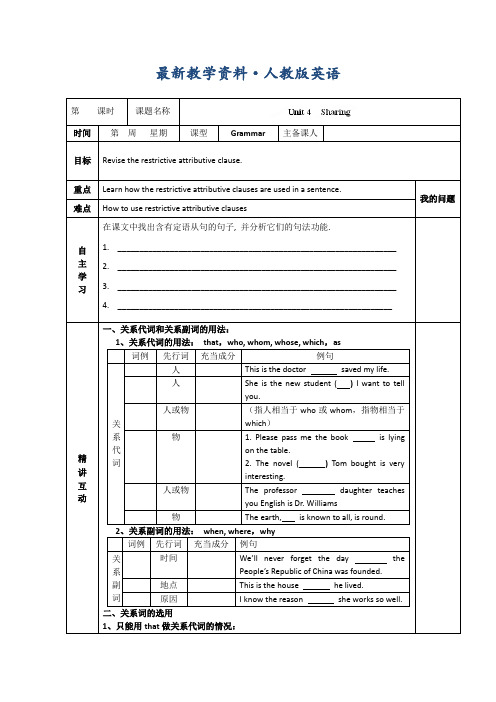
第课时
课题名称
时间
第周星期
课型
Grammar
主备课人
目标
Revise the restrictive attributive clause.
重点
Learn how the restrictive attributive clauses are used in a sentence.Fra bibliotek例句1
在定语从句中
St Petersburg,was once calledLeningrad,
is a very beautiful city.
2
在后面
This is the room inwe lived last year.
3、指人时只能用who不用that的情况:
只能用who不用that的情况
物
The earth,is known to all, is round.
2、关系副词的用法:when, where,why
词例
先行词
充当成分
例句
关系副词
时间
We’ll never forget the daythe People’s Republic ofChinawas founded.
地点
This is the househe lived.
2
as引导的从句可以放在句首, as表“正如…..正象…”之意
we all know, the earth is round.
达
标
训
练
1. That tree, __________ branches are almost bare, is very old.
2. He failed in the examination, __________ made his father very angry.
(完整版)高中英语选修七第四单元导学案

Unit 4 Sharing【学习目标】1.掌握重点单词的用法,提高语言运用能力。
2.自主学习,合作探究。
【自主学习】【重点单词和短语】1. hear from ...意为“收到……的信”, 相当于receive /get a letter from ...。
如:They will be delighted to hear from you.他们会很高兴收到你的来信的。
I hear from my mother every week.每星期我都收到妈妈的信。
[拓展]hear about sth.听说... ...的事Have you heard about the new anticancer drug? 你有没有听说过这种新药?hear of sb. / sth.听说或知道某人/物的情况(主要用于否定句和疑问句)Haven’t you heard of John Denver?难道你没听说过John Denver吗?hear of 还有“听从”的意思,常用于否定句,与will / would连用,例如:He wouldn’t hear of me paying for the bill.我要他付帐,但他不肯。
与hear 相关的短语:hear about 听到关于......的消息 hear from 收到……的来信hear of听说, 听到 hear sb. out 听到某人把话说完hear sb. do sth. 听见某人做了某事 hear sb. doing sth. 听见某人正在做某事2.be dying to do 迫切希望做某事 be dying for sth 渴望得到某物All of them are dying to see the movie. 他们所有人都极想看那部电影。
The children are dying for the Christmas gifts. 孩子们渴望得到圣诞礼物。
人教版高二英语选修七第四单元导学案(完整资料)

此文档下载后即可编辑Unit 4 SharingPeriod 1 Warming up & Reading班级_____姓名编号主编教师张楠课型:新授课审核人签名:预习课(晚自习40分钟)Read A letter home carefully and do the following tasks :Learning aims: 1.Try to grasp the main idea of the passage.2. To learn some new words and phrases in the passage.自学指导1.大声朗读课文后两段,找出有用的短语及句子。
2.完成训练课导学的基础题。
Step1 Fast-reading1.What is the letter mainly about?2.Match each part with its main idea:Part 1 (Paragraph 1): Jo and Jenny visited Tombe’s home in the village.Part 2 (Paragraph 2-3):The school where Jo worked and Jo’s work at school.Part 3 (Paragraph 4-8): Jo and Jenny visited Tombe’s home in the village.Part 4 (Paragraph 9): End of the letter.Opening of the letter and introduction to what will be talkedabout in the passage.Task2 Detailed-reading Complete the sentences with the characters mentioned in the letter:1. ______ is a young Australian woman.2. ________ was dying to hear all about Jo’s life in Papua New Guinea.3. ________ walked a long way to get to the school .4. ________________ didn’t have any textbooks.5. ____became a lot more imaginative when teaching6. ________ started jumping out of the windows during a chemistry experiment.7. ____________ visited a village that was the home of one of the boys, Tombe.8. _______ started crying “ieee ieee” to welcome them.9. ______ led us to a low bamboo hut.10. ______ was going to share the platform with Jenny and Jo.11. _____________ softly talked to each other in their language Jo didn’t understand.Task3 Reading carefullyTrue or false1.The classrooms are made from bricks and the roofs from grass.2. It always takes the boys only a few minutes to get to the school.3. Science is the most challenging subject for Jo.4. When Jo and Jean arrived at the village, they shook hands with all the villagers.5. Tombe threw out the tin can because it’s very dirty.基础题:单词拼写1.In this quiet way, the first________(两星期)of her visit soon passed away.2.Much new knowledge is________(遥远的)from the immediate interest of the ordinary person. 3.There is an active demand for________(作口译的人)during the trade fair.4.An officer climbed on to the________(平台)and spoke to him.5.I cannot understand so abstract c________.6.What things do you do w________or monthly, but not every day?7.He tried to a________his daily plan to leave time for everything.8.What you said is not r________to the matter in hand.9.Do you know how a(n)________(宇航员)flies in a spacecraft?10.The rising sun is especially beautiful to look at from this________(角度).提高题请根据各句上下文的意义,选择正确的单词填入空白处。
人教版高中英语选修七Unit4《Sharing》word导学案

人教版高中英语选修七Unit4《Sharing》word导学案第一课时学习目标:1. 了解社会中关心弱者、理想服务、合作共享等的重大意义及有关实例2. 培养学生的社会责任感3. 互助、合作、理想服务等方面的英文表达4. 复习限制性定语从句学习重点:1. 培养学生在日常生活中关心他人、扶贫救困的爱心2.复习限制性定语从句I. Read the passage and find out the following phrases from the passage on page29-30.1. 收到 ---- 的来信 _________________2. 极想; 期望 _____________________3. 多达;一直到... __________________4. 适应 ________________________5. 无疑,确信________________________6. 不久的前一天 ___________________7. 偶然遇见 ________________________8. 与…有关________________________9. 开始了解 ________________________ 10. 看到奇异的景象__________________ 11. 从...中伸出 ____________________________ 12. 生火_______________________ 13. 参与; 参加______________________ 14. 完全变干; 干透__________________15. 干涸 ____________________________ 16. 老实说 ________________________ II . Read the first text---A Letter Home and choose the best answer.1. On seeing the mixture bubbling in the experiment, the boys jumped out of the windows as they were too ________.A. excitedB. disappointedC. frightenedD. crazy2. Sometimes Jo would not be quite sure about ______.A. whether she was liked by her studentsB. whether her lessons were lively and interestingC. whether her students could learn much from her teachingD. whether her teaching could do any good to her students’ lives3. Jo wrote the letter to her friend Rosemary in order to ________.A. encourage her friend to work in Papua New GuineaB. warn her friend not to come to Papua New GuineaC. describe her working experience in Papua New GuineaD. introduce a new country Papua New Guinea to her friend4. Which of the following statements about Tombe’s family is NOT true?A. They talked warmly with Jo.B. They had a good relationship with their neighbors.C. They had their special belief.D. They seldom met strangers.5. The author wondered how relevant chemistry is to the kids because __________.A.he thought chemistry was uselessB.he thought chemistry was too advanced to learnC.he thought most of the kids would be going back to their villages after Year8 and they wouldnever use chemistry they had learnt.D.he thought chemistry could make difference to the kids’ lives6. Why did Tombe throw out the tin can?A.Because he believed the can attracted evil spirits.B.Because he believed any leftovers attracted evil spirits.C.Because he believed the can had no use at all.D.Because he believed the grill attracted evil spiritsIII. Fill in the blanks to summarize the passage:Thanks for your letter. It was wonderful to ______ from you. I know you’re ______ to hear all about my life in PNG, so I’ve _______ some photos which will help you picture the places I talk about. The classrooms are made _______ bamboo and the _______ of grass. It takes boys ______ ______ two hours to get to school.Students have no _______ of doing experiments and there is no equipment. Sometimes,I wonder how _______ chemistry is to these students, most of _______ will be goingback to their villages after Year 8 anyway. To be honest, I doubt whether I’m making any ________ to these boys’ lives at all.Another teacher , Jenny, and I did _______ a village which is the home of one of the boys, Tombe. It was my first visit to a ________ village. Tombe’s father, Mukap, led us to his house, a low bamboo hut with grass ________ out of the roof.The hut was dark inside so it took time four our eyes to _______. I loved listening to the family softly _______ to each other in their language, even though I could not ________ in the conversation. We left the village the next morning . It was sucha ______ to have spent a day with Tombe’s family.IV. Analyze these sentences of the first text and translate them into Chinese.1. We walked for two and a half hours to get there--- first up a mountain to a ridgefrom where we had fantastic views and then down a steep path to the valley below.2. The other day (_________)I ______ _______ (正在做演示)the boys the weeklychemistry experiment _______(这时), before I knew it, the mixture was bubbling over everywhere!3. Sometimes I wonder _____ _______ ________ ____ ____ (化学对这些小孩怎么说有多大的用处)these students, ________ _____ _______(他们中的大多数人)will be going back to their villagesafter Year 8 anyway.4.____ _____ _______(说实在的), I doubt _______ ____ ________ _____ _____ ______these boys’ lives at all(我确实不明白我教的课是否会让这些小孩的生活有所改变).Book7 Unit4 Sharing 导学案第二课时1. 课本原句:I know ______ ________ _____ hear all about my life here, so I’veincluded some photos which will help you picture the places I talk about. 我明白你急于了解我在这儿的生活情形,因此我在信中附有几张照片,会关心你想象出我所谈到的地点。
人教版选修7导学案:unit 4 sharing reading(学生版)(精修版)
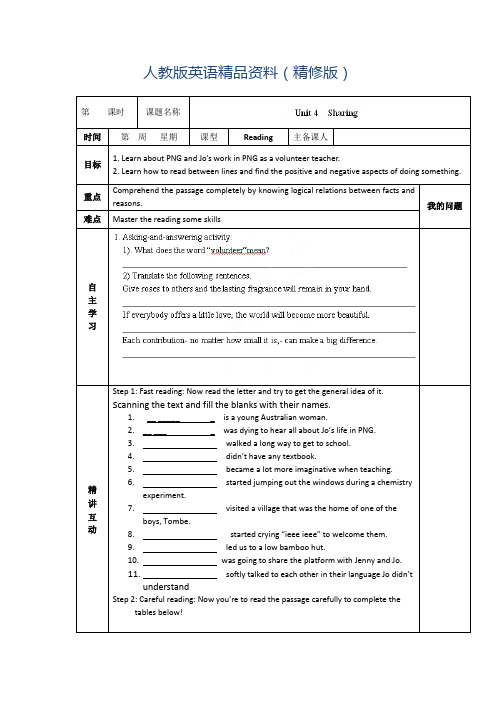
人教版英语精品资料(精修版)第课时课题名称时间第周星期课型Reading主备课人目标1. L earn about PNG and Jo’s work in PNG as a volunteer teacher.2. Learn how to read between lines and find the positive and negative aspects of doing something.重点Comprehend the passage completely by knowing logical relations between facts and reasons.我的问题难点Master the reading some skills自主学习精讲互动Step 1: Fast reading: Now read the letter and try to get the general idea of it. Scanning the text and fill the blanks with their names.1.__ _____ _ is a young Australian woman.2.__ ___ _ was dying to hear all about Jo’s life in PNG.3.walked a long way to get to school.4.didn’t have any textbook.5.became a lot more imaginative when teaching.6.started jumping out the windows during a chemistryexperiment.7.visited a village that was the home of one of theboys, Tombe.8.started crying “ieee ieee” to welcome them.9.led us to a low bamboo hut.10.was going to share the platform with Jenny and Jo.11.softly talked to each other in their language Jo didn’tunderstandStep 2: Careful reading: Now you’re t o read the passage carefully to complete the tables below!。
(完整版)人教版英语选修七unit4-reading导学案
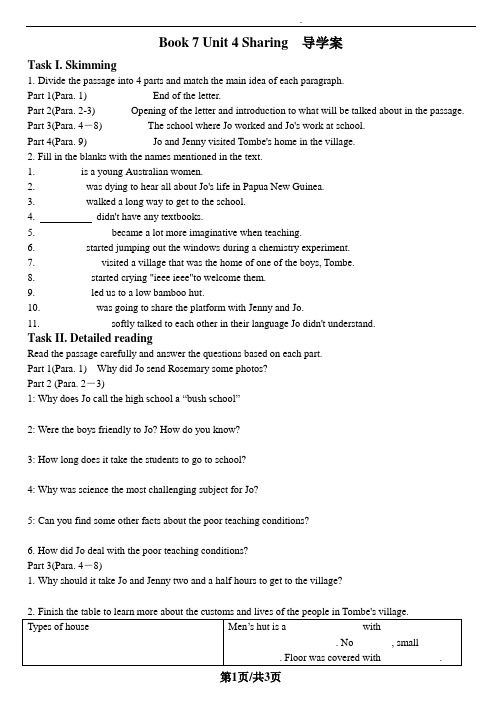
Book 7 Unit 4 Sharing 导学案Task I. Skimming1.Divide the passage into 4 parts and match the main idea of each paragraph.Part 1(Para. 1) End of the letter.Part 2(Para. 2-3) Opening of the letter and introduction to what will be talked about in the passage. Part 3(Para. 4-8) The school where Jo worked and Jo's work at school.Part 4(Para. 9) Jo and Jenny visited Tombe's home in the village.2. Fill in the blanks with the names mentioned in the text.1. ________ is a young Australian women.2. _________ was dying to hear all about Jo's life in Papua New Guinea.3. _________ walked a long way to get to the school.4. didn't have any textbooks.5. ______________ became a lot more imaginative when teaching.6. _________ started jumping out the windows during a chemistry experiment.7. ____________ visited a village that was the home of one of the boys, Tombe.8. __________ started crying "ieee ieee"to welcome them.9. __________ led us to a low bamboo hut.10. __________ was going to share the platform with Jenny and Jo.11. _____________ softly talked to each other in their language Jo didn't understand.Task II. Detailed readingRead the passage carefully and answer the questions based on each part.Part 1(Para. 1) Why did Jo send Rosemary some photos?Part 2 (Para. 2-3)1: Why does Jo call the high school a “bush school”2: Were the boys friendly to Jo? How do you know?3: How long does it take the students to go to school?4: Why was science the most challenging subject for Jo?5: Can you find some other facts about the poor teaching conditions?6. How did Jo deal with the poor teaching conditions?Part 3(Para. 4-8)1.Why should it take Jo and Jenny two and a half hours to get to the village?1. Science is the most difficult subject as the students know a little about doing experiments.2. In Tombe’s village, all people a re the relatives of his family.3. As it is very remote, it took two weeks to arrive in PNG .4. Since I arrived, I have been always self-confident.5. Tombe’s families were so friendly that they laid fresh grass on the floor for me.6. Before my volunteer career, I learnt a lot about the local custom and natives.7. Even it is poor and less developt, I suited the local condition soon after my arrival.8.Many of the boys have to walk a long way to school and I usually walked up to two hours.9. Boys jumped out of the windows as they were scared.10. Now I knew local people quite well after I visited Tombe’s family.11. I visited Tombe’s family alone.12. The villagers’ huts are similar to school classrooms except that they were small and darkinside.Task IV. Summary1. How did the writer’s feelings and attitudes change when she worked in local school?2. Why does the writer consider it as a privilege to visit Tombe’s family?3. Do you think the passage is well-organized? if you try to writer the passage, what will be your structure like?。
2022年 届人教版高中英语选修七Unit4 period4 using language导学案

The Fourth Period Using language1.通过阅读,参与“Give an unusual gift〞的活动,综合训练学生听说读写四个方面的能力。
2.帮助学生理解志愿者工作的意义,培养学生在日常生活中帮助他人、扶贫救困的爱心。
3. 在小组合作互动中,增强学生的团队合作精神与分享意识。
【教学目标】1.Enable the Ss to know the purpose of a website called “worldgifts〞and give their opinions on it.2.Enable the Ss to learn about the international welfare programmercalled “Plan International〞and a child who has been sponsoredthrough it.【重难点分析】Get the Ss to realize that they should make the most of what theyown and do something for the poor.【教学过程】Step I. RevisionDictation eight sentences, each contain the vocabulary they’velearned in this unit.Step II. Pre-reading“Have you ever tried to send a gift to the children in poor areas or countries? Probably not.Instead of giving people in poor areas a gift, you give them a card telling them that, on their behalf, you have sent money to an organization that supports people in need.Today, we can have access to a website, where you can send your gifts to those who are in great need.TEAR Australia is a movement of Christians in Australia responding to the needs of poor communities around the world. an organization taking responsibility to balance the global poverty and over-consumption.Please glance quickly at the Internet page on Page 33, and answer the following questions.1.What does the page show you?2.Where is the list of gifts?3.In what kind of order are the gifts listed? How much are cheapestand dearest gift?4.where is the gift card?5.What do the photos show you?Keys:1.The page shows a gift catalogue. The list of gifts is on the bottomleft side of the page.2.They are ordered from the cheapest to the dearest. The cheapestgift (A: 20 tree seedlings) costs 5 AUD. The dearest (U: a welland water pump) costs 1,350 AUD. The photos show you howparticular gifts will be used.Step III. Careful Reading Read carefully and Choose a correct gift (A to U) from the Internet page and mark it next to each description below.1. This gift allows a woman who is a trained tailor to make some income, giving her and her family a better future. (India, Tanzania, Kenya) N A sewing machine2. This gift gives a person the opportunity to acquire basic reading and writing, and life skills. Adults develop the confidence to participate in the social, economic and political lives of their communities. (Nepal, India, Bangladesh, Uganda)G Basic adult education3. This gift covers the cost of production and distribution of seedlings, as well as training in tree care for the local villagers who are workinghard to prevent their land from turning into desert. (Kenya, Tanzania, India) A 20 tree seedlings4. This gift buys a goat. A goat gives milk and is a valuable income. Goats increase in number quickly and add much to a family's food and financial security. They are easy and fun for children to care for. (Nepal, India, Uganda) J A goat for a poor family5. This gift covers the cost of exercise books and textbooks for community primary schools that operate in poor or remote villages. (Southern Sudan)F Basic health-care services6. This gift gives a child a good start in life. Community schools provide good quality education for children who would otherwise have no opportunity to attend school. (Bangladesh, Kenya, Uganda) I One year of primary schoolingStep 4 Language points1. in need 在困难中;在危难中When (you are) in need, don't hesitate to ask me for help.We are collecting money for children in need.in need of 需要…The doctor told me I was in need of a good rest.in在这里表示“处于…状态、情况中〞,类似结构的短语有:in danger, in difficulty, in tears, in poverty, in ruins, in love, in doubt, in a good health, in a bad mood2. purchase v. / n. 买;购置;赢得He purchased this stamp at an auction.They purchased life at the expenses of honor.He worked all summer to save money for the purchase of a piano.He filled the car with his purchases.buy 是最为普遍的用词, purchase 有时在较为正式的场合出现,而且有经过“深思熟虑〞才决定购置的意味。
高中英语选修七UNIT4学案
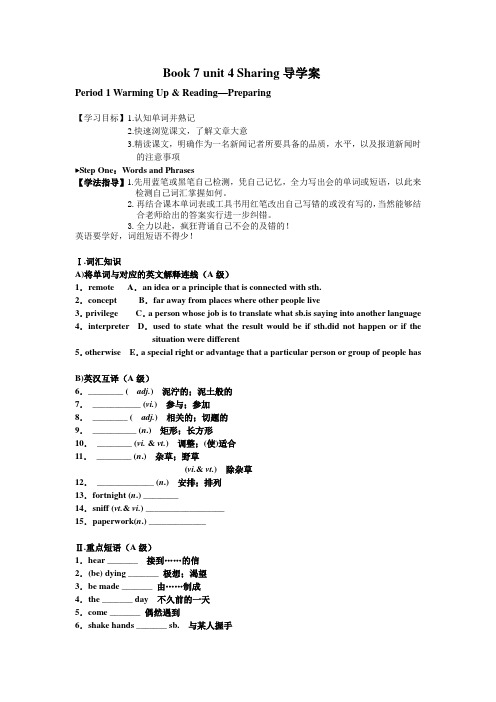
Book 7 unit 4 Sharing导学案Period 1 Warming Up & Reading—Preparing【学习目标】1.认知单词并熟记2.快速浏览课文,了解文章大意3.精读课文,明确作为一名新闻记者所要具备的品质,水平,以及报道新闻时的注意事项►Step One:Words and Phrases【学法指导】1.先用蓝笔或黑笔自己检测,凭自己记忆,全力写出会的单词或短语,以此来检测自己词汇掌握如何。
2.再结合课本单词表或工具书用红笔改出自己写错的或没有写的,当然能够结合老师给出的答案实行进一步纠错。
3.全力以赴,疯狂背诵自己不会的及错的!英语要学好,词组短语不得少!Ⅰ.词汇知识A)将单词与对应的英文解释连线(A级)1.remote A.an idea or a principle that is connected with sth.2.concept B.far away from places where other people live3.privilege C.a person whose job is to translate what sb.is saying into another language 4.interpreter D.used to state what the result would be if sth.did not happen or if the situation were different5.otherwise E.a special right or advantage that a particular person or group of people hasB)英汉互译(A级)6.________ (adj.) 泥泞的;泥土般的7.___________ (vi.) 参与;参加8.________ (adj.) 相关的;切题的9.__________ (n.) 矩形;长方形10.________ (vi. & vt.) 调整;(使)适合11.________ (n.) 杂草;野草(vi.& vt.) 除杂草12._____________ (n.) 安排;排列13.fortnight (n.) ________14.sniff (vt.& vi.) __________________15.paperwork(n.) _____________Ⅱ.重点短语(A级)1.hear _______ 接到……的信2.(be) dying _______ 极想;渴望3.be made _______ 由……制成4.the _______ day 不久前的一天5.come _______ 偶然遇到6.shake hands _______ sb. 与某人握手7.dry _______ (使浸水等之物)完全变干;干透8.dry _______ (指河流、井等)干涸►Step Two:Fast Reading(A级)Scan the text and then choose the best answer according to the text.1.The boys jumped out of the windows when doing the chemistry experiment because they________.A.didn’t like doing chemistry experimentsB.were frightened by the bubbling mixtureC.wanted to ask someone else for helpD.couldn’t stand the terrible smell of the mixture2.Why does Jo wonder how relevant chemistry is to the kids? _______A.Because she thinks chemistry is too difficult to learn.B.Because she thinks chemistry may make little difference to the kids’ life.C.Because the kids there hardly come across anything of chemistry.D.Because she thinks chemistry useless.3.Which of the descriptions is NOT right about Tombe’s house? _______A.It was a low bamboo hut with grass sticking out of the roof.B.It was dark and there was a fireplace in the centre of it.C.It was roundshaped with small windows and a narrow doorway.D.There were only a few possessions in it.4.From the passage,we can infer that “ieee ieee” is mostly________.A.a sign of asking for helpB.a greeting just like “hello” or “welcome”C.a sign of fearD.a sentence just like “Who are you?”5.What’s the main idea of the letter? _______A. Jo told Rosemary what she had done and seen in Papua New Guinea.B.Jo advised us to come to Papua New Guinea.C.Jo encouraged her friend to live in Papua New Guinea.D.Jo introduced the local people’s battle against their enemy.►Step Three:Careful ReadingⅠ.Read the text and then answer the following questions.1.Why did Jo send Rosemary some photos?答案:____________________________________________________________________________________________________________ 2.Why does Jo call the high school a “bush school”?答案:______________________________________________________________________3.Why was science the most challenging subject for Jo?答案:____________________________________________________________________________________________________________ 4.How long does it take the students to go to school?答案:____________________________Ⅱ.Read the text quickly and complete the main idea of it.(A级)The text is a letter written by a young volunteer who teaches in a(n) 1.______school in PNG.She writes about her experiences as a teacher and her 2._____ to a student’s village. Ⅲ.Read the text carefully and then match the main idea of each part.Part 1 (Paragraph 1):A.Jo and Jenny visited Tombe’s home in the village.Part 2 (Paragraphs 2~3):B.Closing of the letter.Part 3 (Paragraphs 4~8):C.The school where Jo worked and Jo’s work at school.Part 4 (Paragraph 9):D.Opening of the letter and introduction to what will be talked about in the passage.►Step three:Consolidation(C级)In the letter that Jo wrote to Rosemary,she told of her experiences of being a teacher in a 1. _______ school in Africa.We can imagine how difficult it was for her to work there,since there was no 2. __________or 3. _________,and no 4. ___________for science subjects.And students had to walk 5. __________to the school.It was difficult for her to 6. __________ the localpeople as she didn’t know much Pidgin English,but there was one chance that she managed to visit the home of one of her students.After as long as 7. ___________________hard journey,she and another teacher Jenny arrived at Tombe’s house,a low 8. __________hut with grass 9. ___________of the roof.They entered the room through the narrow 10. __________,and the hut was dark inside so it took time for their eyes to 11. __________.At dinner,Jo and Jenny learned a lot of local traditional customs.Jo really felt it was a great 12. __________to have spent a day with Tombe’s family.►Step Four:Discussion(B级)Would you like work as a volunteer in a poor area? Why?_______________________________________________________________________________ _______________________________________________________________________________ _______________________________________________________________________________ _______________________________________________________________________________【学习反思】预习中我还有哪些不明白的地方?我该怎样去解决?__________________________________________________________________________ Section ⅡWarming Up & Reading-Language Points【学习目标】学习并灵活使用本单元重点词汇和句型。
(完整版)导学案选修七unit4学生版

导学案(B7U4)预习案一、熟读短文Helping the Remote Village援助山村A year ago, the famous astronaut received an invitation by airmail from a remote village. Intending to sniff some fresh air, he and his interpreter paid a fortnight visit there. It was a privilege for them to be there, but they were shocked by what they saw. The tracks were muddy. The river was dry ing up. Most villagers only possessed one broom, a few tin s and several jar s and their rectangular grass huts with round angle s were surrounded by weed s. Besides, their school had no roof and platform, and the students had no concept of click ing a computer at all. They were badly in need.Soon, the astronaut made a generous voluntary donation to the village. There were textbook s for students, sewing machine s for tailor s and tractor s for farmers. His distribution catalogue also included operating a clinic and a trunk library, as well as giving weekly lessons to teach relevant farming knowledge like how to dry out seed s or raise ox en. He himself not only helped do some paperwork but also purchase d grill s for boys to toast potatoes and comb s for girls who were dying to get one. The other day, he heard from the villagers again inviting him to participate in the donation anniversary. For political and security reasons, he couldn’t adjust his outgoing arrangement-otherwise he would go. But his deeds were remembered forever.一年前,那位著名的宇航员收到一份由一个偏远村庄通过航空邮件寄来的邀请。
高中英语 Unit 4 Sharing Reading导学案(学生版)新人教版选修7
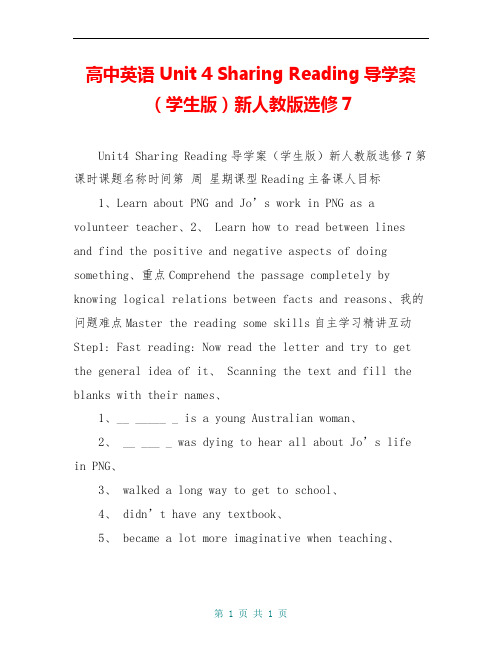
高中英语 Unit 4 Sharing Reading导学案(学生版)新人教版选修7Unit4 Sharing Reading导学案(学生版)新人教版选修7第课时课题名称时间第周星期课型Reading主备课人目标1、Learn about PNG and Jo’s work in PNG as a volunteer teacher、2、 Learn how to read between lines and find the positive and negative aspects of doing something、重点Comprehend the passage completely by knowing logical relations between facts and reasons、我的问题难点Master the reading some skills自主学习精讲互动Step1: Fast reading: Now read the letter and try to get the general idea of it、 Scanning the text and fill the blanks with their names、1、__ _____ _ is a young Australian woman、2、__ ___ _ was dying to hear all about Jo’s life in PNG、3、 walked a long way to get to school、4、didn’t have any textbook、5、 became a lot more imaginative when teaching、6、 started jumping out the windows during a chemistry experiment、7、 visited a village that was the home of one of the boys, Tombe、8、started crying “ieee ieee” to welcome them、9、 led us to a low bamboo hut、10、 was going to share the platform with Jenny and Jo、11、softly talked to each other in their language Jo didn’t understandStep2: Careful reading: Now you’re to read the passage carefully to complete the tables below! Table1 (about the school)Conditions Our schoolThe school described in the letterClassrooms(equipped ornot)Students’ futureElectricity andwater(Y/N)Textbook(Y/N)Chemistry experiments(many/few) Table2 (about the life in the village)Types of housesDietFamily relationshipsPossessionsCookingmethodsAgricultureSleeping arrangementsBeliefs达标训练根据课文内容完成下列短文填空。
选修7unit4导学案第一二课时词汇

Unit4 Sharing 第一二课时词汇主备人:授课人: 授课时间: 评价:学习目标:1.让学生熟练掌握本单元单词和短语,能够准确应用这些单词和短语完成句子。
2.小组合作,自主探究。
3.激情投入,快乐学习。
使用说明&方法指导:1.组合作前学生必须独立完成这张学案并思考2.学生间主动积极合作3.生认真查阅相关的信息(包括词典和练习册)并组织讨论.重点&难点:学会在具体语境中准确、恰当运用所学词汇。
上节目标检测Fill in the blanks according to the text.1_________.n.安排;排列→________ v.安排;排列2._________ vt.捐赠→ _________n.捐献;捐赠→ ________n. 捐赠者3._________adj.自愿的;志愿的;无偿的→_________n.志愿者v.自愿(做)4._________vt.& n.买;购买→ ________(同义词)5.______ vi.工作vt.操作→________n. 操作;手术6 ___________ 极想;渴望7 the other day ____________8 dry out ____________ 9 dry up____________ 10 in need ____________本节目标展示及讲解(以下为重要单词和短语的用法)1. be dying to①All of them are dying to see the movie. ②I am dying for a glass of water.【归纳用法】:________________________;①Many of us are _______ to know what the theme of new project is.A. agreeingB. dyingC. wantingD. desiring②我极想出国【联想拓展】“渴望”的类似说法①be eager to do sth./for sth. ②be anxious to do sth./ for sth.③desire to do sth./for sth ④long to do sth. / for sth.巧学妙记:提到die短语多,病饿冻死of用,相继死亡off拖,绝种绝迹跟out,逐渐消失away选,急切渴望常用进行时。
人教版高二英语选修七unit4 全单元导学案

高二A英语阅读欣赏课专用材料(三)班级姓名编号课型:阅读欣赏课编制:张楠审核:1.Learning goals: Read the following beautiful English passages to develop your reading skills, strengthen your reading practice , broaden your horizon, develop your English-thinking ability and improve your overall English language qualities.2.Suggested methods: careful reading, reading them aloud in early mornings , reciting them to make full use of these excellent materials.3.Reading guide in Chinese:Watching Me Go 赤子情深大人们不理解小孩子,他们总是认为孩子太小了,他们小小的脑袋里装不下什么东西,他们小小的心灵里也不会有太多的想法。
但是只要大人们仔细观察,就会发现孩子们的“小”中承载着大人们难以想象的深情。
My son Brendan cried his first day of school. Even Mrs. Phillips, a kind, soft-spoken master of the six-year-old mind, could not coax him to a seat. His eyes streamed, his nose ran and he clung to me like a snail on a strawberry. I plucked him off and escaped.我儿子布兰登第一天上学哭了,甚至连那位在六岁儿童心目中和蔼可亲、声音柔和的菲利普斯老师也不能把他劝诱到座位上去。
选修7-Unit-4《Sharing》第一导学案

人教新课标选修7 Unit 4《Sharing》教学案单元要点预览教材分析本单元的话题是Sharing,主要涉及帮助弱者、志愿服务、合作分享等。
通过听、说、读、写等各种活动学习相关的语言知识,使学生了解世界上很多地方依然很落后,从而懂得同情,学会分享。
了解一些志愿者工作的信息,培养学生互助合作的精神和社会责任感。
结合针对短文话题的探讨激发学生的国际意识,通过各种渠道力所能及地为贫困地区的孩子作出自己的贡献。
WarmingUp部分是一个调查,分成三项任务:首先回顾自己曾经做过的助人为乐的好事,并采访三位同学;然后,根据调查内容列举班级同学所做的好事;最后讨论volunteer的内涵。
通过这些任务,让学生懂得什么是“帮助”,反思自己是否乐于助人,以及怎样做才是“志愿者”,由此为后面的短文学习做好铺垫。
Pre-reading是Reading的热身活动。
交代了阅读文章的文体(letter)和作者(a young Australian woman,Jo),还根据她在PNG拍的10张照片提出了5个问题,回答这些问题有助于学生加深理解“志愿者活动”的意义。
Reading是一篇Jo写给Rosemary的信。
其中介绍Jo在PNG(PapuaNewGuinea)的一个小山村教书。
在她写给Rosemary的信中,作者描述了该村学校的情况和去一个学生家做客的经历,使学生感受到PNG的儿童生活处境的艰难,更加珍惜自己的学习机会。
Comprehending是根据短文设计的阅读理解试题。
第一个练习要求学生读懂书信的内容,用表格的形式帮助学生整理书信中提到的关于巴布亚新几内亚村落生活及风俗习惯的信息,属于细节题。
第二个练习要求学生对文中提到的五个现象进行分析,说明原因,属于细节推理题。
第三个练习要求学生通过阅读分析生活在小山村中的积极面和消极面,这个练习进一步地开阔学生的思维,使学生对艰苦的生活有更深的理解。
第四个练习要求学生小组活动,讨论四个问题,进一步巩固学生对于课文内容的理解,并且让学生联系自己的实际情况,通过比较校舍、教学条件、生活状况等方面的问题,引发学生的深层思考,谈谈自己是否愿意参加志愿者活动。
(完整版)人教版英语选修七unit4-reading导学案.docx

.Book 7 Unit 4 Sharing导学案Task I. Skimming1. Divide the passage into 4 parts and match the main idea of each paragraph.Part 1(Para. 1)End of the letter.Part 2(Para. 2-3)Opening of the letter and introduction to what will be talked about in the passage. Part 3(Para. 4- 8)The school where Jo worked and Jo's work at school.Part 4(Para. 9)Jo and Jenny visited Tombe's home in the village.2.Fill in the blanks with the names mentioned in the text.1.________ is a young Australian women.2._________ was dying to hear all about Jo's life in Papua New Guinea.3._________ walked a long way to get to the school.4.didn't have any textbooks.5.______________ became a lot more imaginative when teaching.6._________ started jumping out the windows during a chemistry experiment.7.____________ visited a village that was the home of one of the boys, Tombe.8.__________ started crying "ieee ieee"to welcome them.9.__________ led us to a low bamboo hut.10.__________ was going to share the platform with Jenny and Jo.11._____________ softly talked to each other in their language Jo didn't understand.Task II. Detailed readingRead the passage carefully and answer the questions based on each part.Part 1(Para. 1) Why did Jo send Rosemary some photos? Part 2 (Para. 2- 3)1: Why does Jo call the high school a“ bush school”2:Were the boys friendly to Jo? How do you know?3:How long does it take the students to go to school?4:Why was science the most challenging subject for Jo?5:Can you find some other facts about the poor teaching conditions?6.How did Jo deal with the poor teaching conditions?Part 3(Para. 4- 8)1.Why should it take Jo and Jenny two and a half hours to get to the village?2. Finish the table to learn more about the customs and lives of the people in Tombe's village.Types of house Men ’s hut is a ______________ with_____________________. No _______, small__________. Floor was covered with ___________.第1页/共3页.Family relationships Everyone seemed to be a ________ of Tombe ’s. (largeextended family)Cooking methods_________ are placed in an _______, then___________ are placed in the drum, covered with____________ and _____.Sleeping arrangements Kiak usually slept in her_______. A newly made________ for Jenny and me to sleep on.Diet___________, _____ and______.Possessions I could only see a few __________ and _____ and acouple of ____.Agriculture Tools are very basic. There is no ___________.Beliefs The villagers believe that any ________ attract_________ in the night so the food is ________ in thecan and the can is then ___________ of the hut.Task III. Decide which of the following statements is true.1.Science is the most difficult subject as the students know a little about doing experiments.2.In Tombe ’ s village, all peoplereathe relatives of his family.3.As it is very remote, it took two weeks to arrive in PNG.4.Since I arrived, I have been always self-confident.5.Tombe’ s families were so friendly that they laid fresh grass on the floor for me.6.Before my volunteer career, I learnt a lot about the local custom and natives.7.Even it is poor and less developt, I suited the local condition soon after my arrival.8.Many of the boys have to walk a long way to school and I usually walked up to two hours.9.Boys jumped out of the windows as they were scared.10.Now I knew local people quite well after I visited Tombe’ s family.11.I visited Tombe ’ s family alone.12. The villagers’ huts are similar to school classrooms except that they were small and darkinside.Task IV. SummaryJo's high school It ’s a(n) 1____ school—the classrooms are made from2________ and the roofs from grass.There’s no 3________________and we don’t haveany textbooks.Jo's first visit to a Time to get there Two and a half hours of walkingvillageDescription of the A low bamboo hut with grass 4___________ of the roofhouse No windowsNarrow doorwayJo's first visit to a5_____ the house A newly made 6_____for Jenny and me to sleep on village A(n) 7_______in the centre of the hut near thedoorway第2页/共3页.A few tin plates and cups and 8__________ potsOutside the house Mukap 9_____ stones in the fire, and he placed them inan empty oil drum with kau kau, corn and greens.He then 10_______ the vegetables with banana leavesand left them to steam.Task V. Further thinking1. How did the writer’ s feelings and attitudes change when she worked in local school?2. Why does the writer consider it as a privilege to visit Tombe’ s family?3.Do you think the passage is well-organized? if you try to writer the passage, what willbe your structure like?第3页/共3页。
2020年人教版选修7导学案:unit 4 sharing reading(学生版)
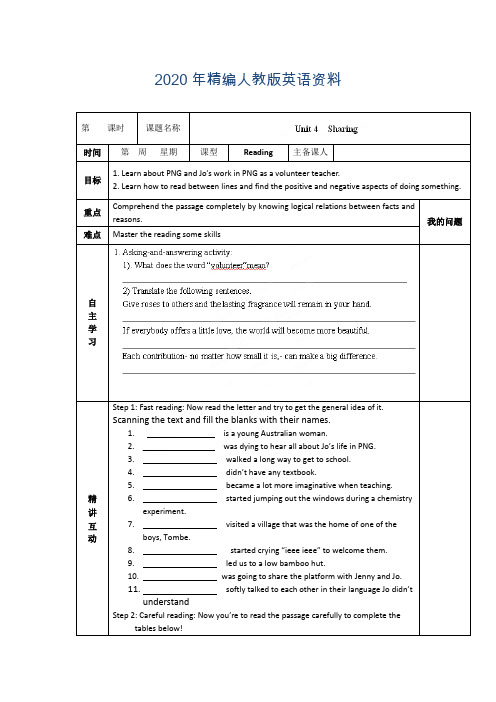
小结
Scanning the text and fill the blanks with their names.
1.__ _____ _is a young Australian woman.
2.__ ___ _was dying to hear all about Jo’s life in PNG.
arrangements
Beliefs
达
标
训
练
根据课文内容完成下列短文填空。
My school is a bush school, whose classrooms are made of ____________ and the roofs of grass. Teaching conditions are terrible. There is no__________ or water and even no textbooks __________! The other day I was showing my students the weekly chemistry experiment__________the mxiture was bubbling over everywhere. Some boys were so frightened __________ they jumped out of the __________ because they had never seen anything like this before. Last week Jenny and I paid a __________ to a village. It took us two and a half hours__________ get there. We were warmly welcomed. We spent the night in a low bamboo__________with Tombe’s mother. We ate their__________food, listening to the family softly talking to each other in their language.
高中英语导学案unit4SharingNewwords1新人教版选修7

1课题:SB7Unit 4New words1 时数(第 周第 课时)班级: 学习目标 学习重点 学习难点 目 标 与 导 入自 学 与 诊 断金昌市一中导学案编写人:To learn the pronunciation and formation of the new words The pronun ciati on and formati on of the new words The pronun ciati on of some new words 学生活动 Aim showing (目标展示) :New words : don ate, volun tary , purchase , anni versary … New phrases:in need , sewing machine , trunk library , choose from Lead-in: Some new words and phrases are necessary.1. 2. 3. 1.2. 3. 教学设计1.Students try to pronounce the new words by following the recorder two timesSs check the pronunciation in group.Some ss ask questionsabout the pronunciation of thenew words, while others try to help him or her to solve 2. the problems. Exercise .、词汇预习:1. airxn^il n M 空邮件 airportairway ________ 2, fortnight twoa fdrttiighi ,s holiday ______ fortnightly (adj / adv)Meetings take place at 皿皿堆1卅 intervals. The committee meets foi tni 法hth” _______roof 屋顶/车顶 n. roofs (pl) proofs gulfs ---------mud —— sun — weekly adj. adj. _/ yearly椭圆一airlinebeliefs 3. 4. Ask the students toread the new words to check their preview.Ask the students to write dow n some formati ons.Ask the students todraw the usages accord ing to senten ces.Ask the students todo the con solidati on and applicati on exercises.chiefsserfsmuddy water/ muddy shoes____/ mon thly 菱形 __ 4participatev ---n.n.合 作互 动学生活动 教学设计互 动 与 展 示After finishing each job, students should show them t their partners and then have a discussionto correct them. After that , the students should show their achievements o the blackboard and give some interpretations, the othermembers can add some.o After fin ishi ngeachjob,ask >n students to showthem to theirpartners And then have a discussion to correct them. Afterthat,eachpoins must be shown on the blackboard.精 讲 与 占 八、、 拨精讲词汇(必须掌握的词)1. relevant adj.相关的,切题的@ be relevant to (have sth. to do with)与 ... 相关1) These facts are releva nt to the case.2) These questi ons are not directly releva nt to his matter.@ relevance n.关联,相关性;贴切,中肯3) What he said has n creleva nee tothe matter in hand. 4) I don ' t see thevanceof your question.我不懂你这个问 题有什么意义。
- 1、下载文档前请自行甄别文档内容的完整性,平台不提供额外的编辑、内容补充、找答案等附加服务。
- 2、"仅部分预览"的文档,不可在线预览部分如存在完整性等问题,可反馈申请退款(可完整预览的文档不适用该条件!)。
- 3、如文档侵犯您的权益,请联系客服反馈,我们会尽快为您处理(人工客服工作时间:9:00-18:30)。
导学案(B7U4)预习案一、熟读短文Helping the Remote Village援助山村A year ago, the famous astronaut received an invitation by airmail from a remote village. Intending to sniff some fresh air, he and his interpreter paid a fortnight visit there. It was a privilege for them to be there, but they were shocked by what they saw. The tracks were muddy. The river was dry ing up. Most villagers only possessed one broom, a few tin s and several jar s and their rectangular grass huts with round angles were surrounded by weeds. Besides, their school had no roof and platform, and the students had no concept of click ing a computer at all. They were badly in need.Soon, the astronaut made a generous voluntary donation to the village. There were textbook s for students, sewing machine s for tailor s and tractor s for farmers. His distribution catalogue also included operating a clinic and a trunk library, as well as giving weekly lessons to teach relevant farming knowledge like how to dry out seed s or raise oxen. He himself not only helped do some paperwork but also purchased grill s for boys to toast potatoes and combs for girls who were dying to get one. The other day, he heard from the villagers again inviting him to participateadjustin the donation anniversary. For political and security reasons, he couldn’t his outgoing arrangement-otherwise he would go. But his deeds were remembered forever.一年前,那位著名的宇航员收到一份由一个偏远村庄通过航空邮件寄来的邀请。
因为想要呼吸一下新鲜空气,他和翻译到那儿做了一次两周的访问。
当地之行使他们倍感荣幸,但却震惊于所见所闻。
泥泞的道路、河流干枯,大部分的村民拥有的财产只不过是一只扫帚、几个瓶瓶罐罐而已,圆角的矩形草屋四周长满了杂草,学校也没有屋顶和讲台,学生们更对点击操作电脑毫无概念。
他们生活确实相当困难。
很快,宇航员就向村庄做了慷慨的自愿捐赠。
捐赠品中有给学生的课本,给裁缝的缝纫机,还有给农民的拖拉机。
捐赠金的分配目录中还包括一间诊所和一间书箱图书馆的运作,并有传授像怎么使种子干透,或者怎么养牛这种相关农业知识的每周课程。
他自己不仅亲自帮助做一些文书工作,还给男孩子们购买了烤马铃薯的烤架、给渴望得到梳子的女孩子们买了梳子。
前几天,他又收到了村民们邀请他参加捐赠周年会的来信。
出于政治和安全原因,他无法调整外出时间安排,否则他就会去了。
不过他所做的一切村民们都永远记得。
二、背诵短文类型:对比说明。
典例:今昔对比类。
模板:More and more people rely on e-mail and mobile phones for communication rather than letters and public phones because the new tools seem faster and make work more efficient. However,this change has bad as well as good effects,especially dependence on the Internet. Firstly,as we lack enough practice,we are losing the beauty of hand-written Chinese words which express the writer better while machine words all have the same looks. Secondly,our spelling becomes worse if we rely on the machine too much. Last but not least,the PC screen does harm to our eyes. I prefer theold way of communication even though it is much too slow in the eyes of many.三、词汇(一)单词1. ________ n. 概念;观念2. ___________ n. 周年纪念(日)3. ___________ n. 宇航员;太空人4. ________ n. 门诊部;小诊所5. _____________ n. 安排;排列6.__________ n. 矩形;长方形7._________ n. 特权;特别优待8. _________ vt.&vi. 嗅;闻;用鼻子吸9. _______ vt. 捐赠10.__________ vt. 分配;分发11._______ vi. 工作;运转vt. 操作12._________ vt.&n. 购买;买→(同义词) _____13.________ adj. 遥远的;偏僻的14._________ adj. 有关的;切题的15.__________ conj. 否则;不然adv. 用别的方法(二)短语1. 接到……的来信____________________2. 极想;渴望_________________________3. 不久前的一天_________________________5. 干透;使完全变干_____________________6. 干涸_______________________7. 在困难中;在危急中________________8. 多达;胜任_____________________9. 老实说__________________________10.起作用;有影响____________________________(三)构词法1.__________ vi. 参加;参与→______________ n. 参与;参加;分享→___________ n. 参与者;参赛者2.__________ adj. 自愿的;志愿的;无偿的→__________ n. 志愿者→____________ adv. 自愿地;无偿地;自动地3.________ n. 安全;保障→________adj. 安全的;稳当的4._______ vt.&vi. 调整;(使)适合;校准→__________ adj. 可调节的→__________ n. 调节;调整5.______ n.泥; 淤泥; 泥浆→______ adj.泥泞的; 模糊的; 混乱的用以上词汇的适当形式填空1. All _____________ are required to work hard to build positive contributions to society and have lots of fun!2. Life is a journey and sometimes we need to make ____________ along the way.3. We saw a large group of people walk through the _______ country road.4. In China, some workers work overtime___________ for more money.awareness 5. We should reinforce the traffic _________ education to raise people’stowards safety.四、概括课文大意故事讲述了Jo 作为一个志愿教师在一个遥远的地区工作的经历,并且详细的描述了他第一次到Tombe 家探访的经过。
The passage t ells us about Jo’s experience as a _______teacher i n a poor _______ area and also gives us a ________ of his first _______ to Tombe’s family.五、课文阅读理解1.Why did Jo send some pictures to Rosemary? ________A.To give Rosemary a vivid impression of the place she talked about.B.To show the beautiful scenery.C.To show her pity to the villagers.D.To please Rosemary.2.What was the classroom made from? __________A.Grass.B.Bamboo.C.Branches. D.Bricks.3.How long did it take Jo to get to the school? _________A.Two hours. B.Two and a half hours.C.A few minutes. D.One hour.when Jo arrived at the village? 4.Why Tombe's mother started crying “ieee ieee” ______A.To threaten her.B.To show her surprise.C.To show her fear.D.To show welcome.5.Why did Tombe throw the can with leftover food out of the doorway? ________ A.Because he believed the leftover in the can would bring bad fortune. B.Because he did not need the can again.C.Because he thought the can was too dirty to use.D.Because he had too many cans.六、课文语法填空Jo worked at a bush school 1.__________ classrooms were made of bamboo andIt took the students the roofs of grass. There’s no electricity 2.________ water there.about two hours 3.____________ (get) to the school. Jo hoped to make someThe 4.________ day,Jo visited difference to the children’s lives by teaching them.,Tombe’ s mother who had been Tombe’s home.5.________ they arrived at the village.working in her garden,6.________(start) crying “ieee ieee”Tombe’s father led them to his house,7.____________ l ow bamboo hut with grass 8.____________(stick) out of the roof,where he could only see a few tin plates and cups and a couple of pots. What they ate were sweet potatoes,corn and greens. That night Jo and Jenny slept on a 9.____________(new) made platform.10.________ left the village the next morning after many goodbyes and firm handshakes.探究案一、重点词汇1. adjust vt .& vi.调整;(使)适合;校准搭配: adjust sth. (to sth.) 调整(以适应/适合)adjust to (doing) sth. 适应(做)某事adjust/adapt oneself to sth. 使自己适应于……make adjustments for/to 为/对……作调整根据括号内的汉语提示完成句子。
